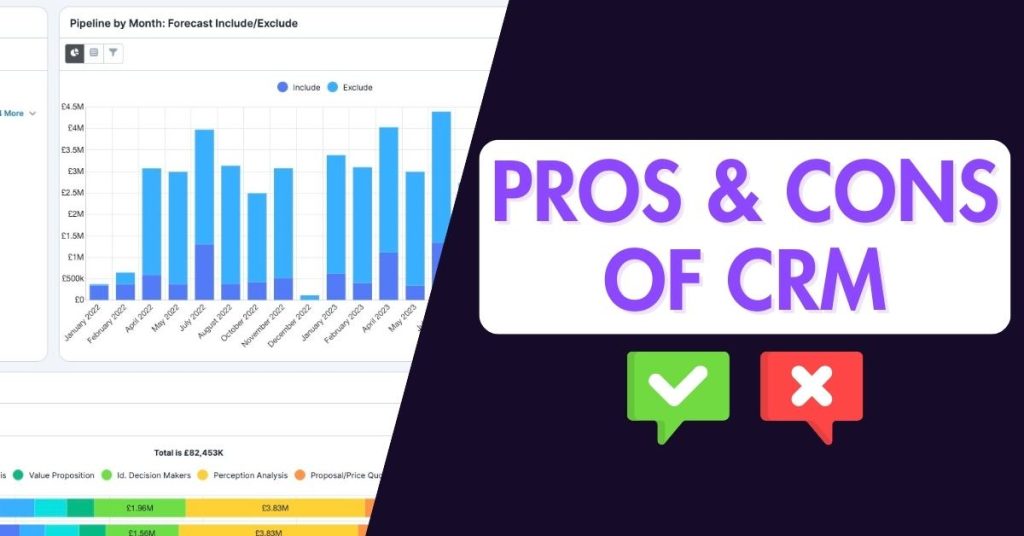Pros and cons of CRM systems

Customer relationships are the heartbeat of any business. Whether you’re a small startup or an established enterprise, managing interactions, tracking leads, and nurturing customer loyalty can mean the difference between growth and stagnation. That’s where Customer Relationship Management (CRM) systems come in.
Like any tool, CRM software brings both advantages and challenges. Let’s break them down —and explore how the “cons” can be solved, —before arriving at the bigger picture.
The pros of a CRM system

1. Centralised customer data
A CRM system stores all customer information in one place, —contact details, purchase history, past conversations, and preferences, —making it easy for your team to pick up where the last interaction left off. Learn more in our blog, CRM for Dummies.
2. Improved communication
It’s a common myth that CRMs are only for sales, marketing, and customer service teams. In reality, your entire business benefits, from admin and HR to project teams and beyond. With everything in one place, you’ll eliminate duplicate efforts, reduce mistakes, and improve communication across departments, leading to better service.
3. Streamlined sales process
With features like lead tracking, automated reminders, and sales forecasting, CRMs help sales teams close more deals. Sales managers can also use custom dashboards to view pipelines, manage targets, and even gamify their sales processes.
4. Better customer insights
CRM reporting and analytics tools help you spot trends, identify loyal customers, and adjust strategies based on data, not guesswork. Track metrics such as churn rate, ROI, forecasts, and targets vs. won opportunities.
5. Scalability
Whether you have 50 customers or 50,000, a CRM grows with your business. The right system adapts as your needs evolve. Another common myth is that small businesses don’t need a CRM, something we strongly disagree with!
6. Tailored to you!
Out-of-the-box systems may look the same, but platforms like SugarCRM and EspoCRM allow you to build a bespoke solution tailored to your business. Working with a CRM partner ensures your system is designed around your unique needs, making it feel like an extension of your workforce.
The cons of a CRM system (and how to solve them)

1. Cost concerns
The Issue: CRM platforms often come with subscription fees, setup costs, and add-ons. Leading systems like Salesforce and HubSpot can be expensive, which may deter smaller businesses.
The Solution: Choose a provider with flexible pricing that fits your budget. Systems like EspoCRM offer affordable entry points and scalable tiers.
2. Complexity and learning curve
The Issue: Some CRMs can feel overwhelming at first, with too many features and a steep learning curve. This may lead to poor adoption.
The Solution: Select a user-friendly CRM and invest in proper onboarding and training with a reliable partner. Start with core features, then expand gradually.
3. Resistance from teams
The Issue: Employees may view CRMs as extra work or a threat to their established routines, especially if they’re left out of the implementation phase. With 30%–70% of projects failing at rollout, early involvement is key.
The Solution: Include your team from the start. Demonstrate how a CRM saves time, reduces manual tasks, and makes their jobs easier. Encourage adoption through incentives and regular feedback.
4. Integration with existing tools
The Issue: Businesses often worry whether a CRM will integrate with their current tools. Poor integration can lead to silos and duplicate efforts.
The Solution: Look for CRMs with strong integration capabilities. Modern platforms connect seamlessly with email, marketing, and accounting tools. Alternatively, work with a partner who can build custom integrations to fit your needs.
While challenges exist, every “con” of CRM use is solvable with the right approach, and with the right partner. If you’re ready to begin your CRM journey, explore our solutions and pricing to make sure you’re maximising the pros and minimising the cons.
Our solutions:



